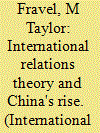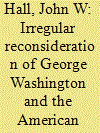| Srl | Item |
| 1 |
ID:
101625


|
|
|
|
|
| Publication |
2010.
|
| Summary/Abstract |
Whether China's rise as a great power will be peaceful or violent is a question that animates scholars and policymakers alike. Power transition theory and offensive realism reach pessimistic conclusions about China's potential for armed conflict because of the benefits of aggression. Nevertheless, applications of these theories to China's rise fail to examine the size and scope of these benefits and to compare them systematically to the costs of conflict that other scholars have identified. To fill this gap, this article applies different international relations theories to identify potential benefits in one defined issue area, territorial conflict, and then weighs these benefits against the likely costs. The potential benefits of territorial expansion are limited, a finding that weakens confidence in the predictions of power transition theory and offensive realism but increases confidence in more optimistic arguments about China's rise based on economic interdependence.
|
|
|
|
|
|
|
|
|
|
|
|
|
|
|
|
| 2 |
ID:
133129


|
|
|
|
|
| Publication |
2014.
|
| Summary/Abstract |
By synthesizing recent works on early American warfare and biographies of George Washington with his own writings, this essay attempts to reconcile divergent interpretations of Washington as a paragon of frontier martial virtue, a pedant for European orthodoxy, a genius, and a stumblebum. The officer who emerges is a martial cosmopolitan; the forces he constructed and the strategy by which he employed them were the hybrid products of his own experience on the American frontier and European precedents for both grande and petite guerre. Ultimately, they served his nation's dearest interests: independence and territorial expansion at the expense of American Indians.
|
|
|
|
|
|
|
|
|
|
|
|
|
|
|
|
| 3 |
ID:
132007


|
|
|
|
|
| Publication |
2014.
|
| Summary/Abstract |
William Eleroy Curtis was central to the creation of the Pan-American movement in the United States. As a lobbyist and bureaucrat, he helped organize the first Inter-American Conference in 1889-1890. As a journalist he became a leading "expert" on Latin America. This article uses Curtis to explore the relationship between Pan-Americanism and empire. Before 1898, Curtis sought only expanded trade, not territory for the United States. However, to explain why the country would "naturally" come to dominate Latin American markets, he depicted Latin Americans as backward yet capable of uplift through the infusion of U.S. knowledge and capital. He thus justified hemispheric control and helped U.S. Americans envision empire as a tutelary imperative. When Curtis supported territorial expansion in 1898 he did so in the language of civilizing mission rather than market aggrandizement. In combining narratives of difference and equality, Pan-Americanism served Curtis as a transitional imperial ideology.
|
|
|
|
|
|
|
|
|
|
|
|
|
|
|
|
| 4 |
ID:
131526


|
|
|
|
|
| Publication |
2014.
|
| Summary/Abstract |
I examine the role of US land policy in strategically controlling and moving populations around the continent with the goal of expanding borders and securing and incorporating new territory on the frontier. The government effectively used land policies and population control to enable an otherwise constrained American state to assert authority over the direction of expansion, to engineer settlement patterns in a manner to secure the territory without a large military, and to maintain an official fidelity to constitutional principles while engineering a dominant racial vision. I examine both the success and failures of these policies over the nineteenth century, with material drawn from government documents and primary sources. I discuss the consequences of this land policy for how we understand the American state in the context of comparative state and racial formation.
|
|
|
|
|
|
|
|
|
|
|
|
|
|
|
|